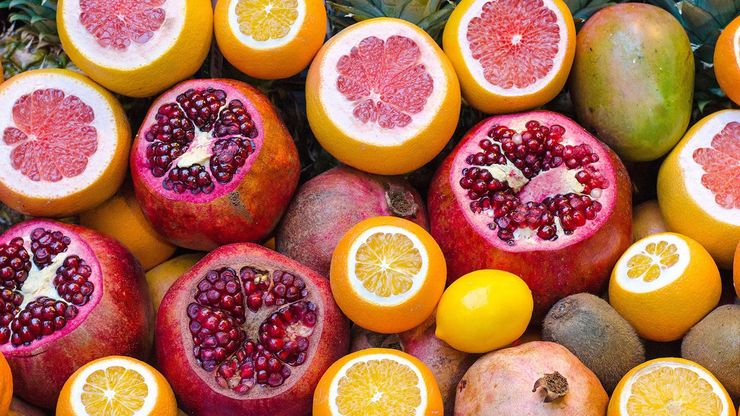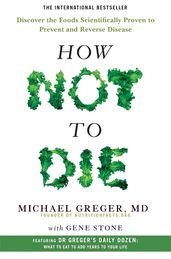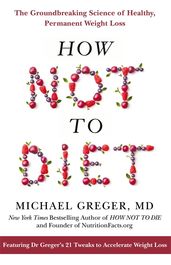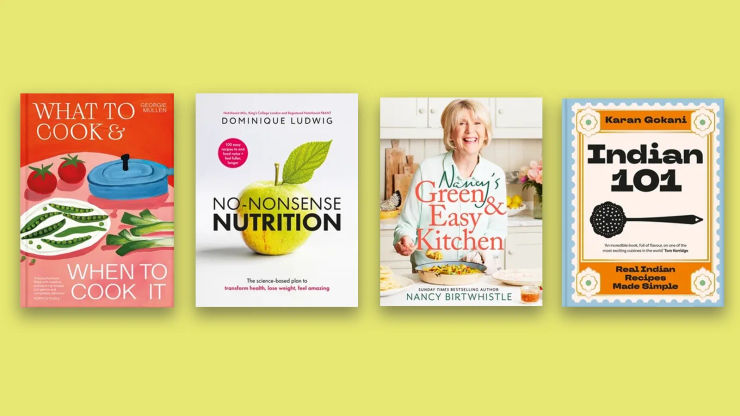12 foods to help you live longer
Dr Michael Greger's Daily Dozen – 12 things to eat, drink and do for a longer, healthier life.

Dr Michael Greger, an expert in whole-food, plant-based nutrition and author of How Not To Die and How Not to Diet, swears by his Daily Dozen – the things he eats, drinks and does every day to help him live a longer, healthier life. Here, we take a look at the 12 things you should be including in your daily diet and routine to optimise your health; no more fad diets or food trends, just a healthy plant-based lifestyle.
Beans
Beans really are a wonder food, providing an excellent source of protein, as well as the nutrients from the vegetable kingdom, and they help to reduce the chance of developing cancer. Black beans, kidney beans, peas, and lentils are just some of the beans you should try to include every day. Dr. Greger suggests three servings of beans a day, so why not try beans on toast for breakfast, a three-bean salad for lunch, or make a delicious bean chilli for dinner?
Berries
Berries make a delicious summer breakfast treat when added to your cereal, and just one serving a day can help boost your immune system against those nasty summer colds. Blackberries, blueberries, and strawberries are readily available fresh or frozen, but why not try some lesser-known varieties such as the gooseberry or barberry?
Other fruits
We’ve all heard that an apple a day will keep the doctor away, but did you know that three servings of fruit a day can help to reduce the likelihood of developing type 2 diabetes? Make a fruit salad for dessert and throw in a selection, from bananas and kiwi fruit to the more exotic papaya and passion fruit.
Cruciferous vegetables
Love them or hate them, brussels sprouts contain sulforaphane, a potential anticancer agent that helps to keep your brain and eyesight healthy. Thankfully for sprout-haters, sulforaphane is also found in broccoli, cauliflower and watercress, and one serving each day is all you need.
Greens
Your parents were right when they told you to eat your greens because dark-green, leafy vegetables offer the most nutrition per calorie of all whole foods. Top your pasta with a handful of rocket, make a leafy green salad or add a side of spinach to your dinner, but make sure you’re getting two servings per day to get the full benefits.
Other vegetables
You’re undoubtedly already aware of the health benefits of eating a wide variety of veggies, but researchers have also found that there could be beauty benefits too. Women who regularly ate more green and yellow coloured vegetables were found to have less facial wrinkling, so put down that expensive eye cream and pick up some vegetable crudités.
Flaxseeds (or linseeds)
Just a tablespoon of flaxseeds a day can help to prevent high blood pressure and various types of cancer. Add a tablespoon of ground flaxseeds to a smoothie, or make your own flaxseed crackers.
Nuts and seeds
Not only has eating a handful of nuts at least five times a week been found to extend your life span by an extra two years, but nuts have can also help you to burn more fat by giving your metabolism a boost. So why not put down the biscuits and reach for the nuts instead when that mid-afternoon slump hits in the office? Walnuts have been proven to have the most health benefits.
Herbs and spices
Various herbs and spices, including fenugreek, coriander, and ginger have many health benefits, but the one spice that you should make sure you’re including in your daily diet is turmeric. There’s been a lot of talk about turmeric as a superfood in the last few years, and in this case, the hype is justified, with the spice being shown to help prevent cancer and treat inflammatory conditions. A quarter of a teaspoon of fresh tumeric per day is all you need.
Whole grains
Possibly the best dietary advice we’ve heard in quite some time, bread and pasta are actively good for us! Three servings of whole grains a day, including whole wheat bread and pasta, can help to reduce the risk of a whole host of conditions including heart disease, type 2 diabetes and strokes.
Beverages
We all know that drinking plenty of water keeps us hydrated and our skin glowing, but a high intake of water could also help to reduce bladder cancer and heart disease. Dr. Greger suggests five glasses of water per day, but tea and coffee can also have various health benefits.
Exercise
Switch off Netflix and get active, because regular exercise has been proven to improve your mood, the quality of sleep and to ward off cognitive decline. Ninety minutes of moderate-intensity activity such as dancing, yoga or gardening, or forty minutes of vigorous activity such as squash, rugby, swimming laps or step aerobics is what you should be aiming for, but every little helps.
How Not To Die
by Michael Greger MD
Why rely on drugs and surgery to cure you of life-threatening disease when the right decisions can prevent you from falling ill to begin with?
With emphasis on individual family health history and acknowledging that everyone needs something different, Dr Michael Greger offers practical dietary advice to help you live longer, healthier lives.
How Not to Diet
by Michael Greger MD
Dr Michael Greger, author of the bestselling How Not to Die, offers an easy approach to a healthy, plant-based lifestyle which will help you put an end to dieting and weight-loss struggles. Dr Greger explores the many causes of obesity, and breaks down a variety of approaches to weight loss using cutting-edge dietary research.



